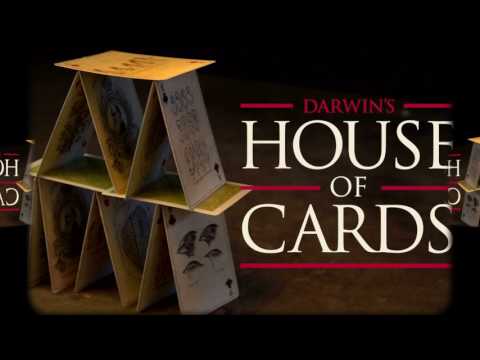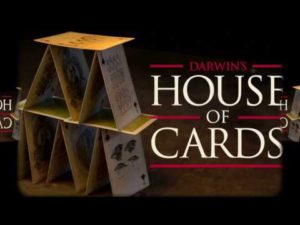Darwinists are fond of saying that evolution is a “fact.” Maybe, but facts are not self-explanatory. Most people who believe in evolution as an undirected, material process of random mutation driven by natural selection, are sincere and think the “facts” compel us to believe this. Unfortunately for them, there is much disagreement about the “facts,” not that you’d know that from elite Western cultural institutions like education and the media. In a recent piece at Evolution New and Views about a new book by long time journalist Tom Bethell, Darwin’s House of Cards, the introductory paragraph gets it right:
The popular media’s attitude on evolution mixes several elements: loathing for the large part of the public that doubts the Darwinian narrative, preening at its own (presumed) superiority in grasping science, and a fawning reverence for evolutionary biologists. Added to this is an unwillingness to weigh the evidence for themselves, offering the excuse that the experts must know best, so why bother? Veteran journalist Tom Bethell’s new book offers a marvelous implicit rebuke on each of these points, but on the last in particular.
It’s fascinating in our supposedly enlightened times that scientists or “experts” have become imbued with as much religious authority than any church figure of the Middle Ages. If “science” asserts something, it must be indisputably true! If anyone has the temerity to question the “science,” the weeping and gnashing of teeth that result would make Grand Inquisitor Torquemada proud, with my apologies to the good Father.
Many “facts” people think the issue is a simple scientific one, but every creation narrative has metaphysical, philosophical, and religious implications, all mutually exclusive. For example, if the Bible is true, then pantheism can’t be true—Christianity, like Judaism and Islam, says the universe is not eternal and that God is not synonymous with the universe, as does pantheism. Or if the Bible is true, then a random, purely material process can’t explain the universe as materialists-atheists insist it does. And if the universe isn’t eternal, as Big Bang cosmology implies, then the materialist-atheist view has real problems: where did the material come from? The piece quoted above gets to the heart of the problems with evolution as currently understood, that it’s foundation was built “on a 19th century faith in Progress, propped up by a dogmatic commitment to materialism.” Quoting Bethell:
At the moment, I believe, the science of Darwinism amounts to little more than the “wedding” of materialism and Progress. We have seen that if materialism is true, then Darwinism — or something very much like it — must also be true. But materialism is highly improbable and has been widely challenged.
Darwin and his enthusiasts always championed evolution more based on the assumptions of materialism and progress, than on the “facts.” And even as atheism is supposedly on the rise in the West, science has increasingly made the materialism that undergirds it increasingly implausible. I look forward to carefully reading Bethell’s book to see how he makes the case for this tottering house.
* Cross posted at http://keepingyourkidschristian.com/


